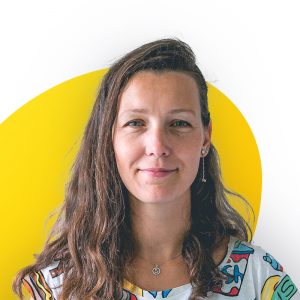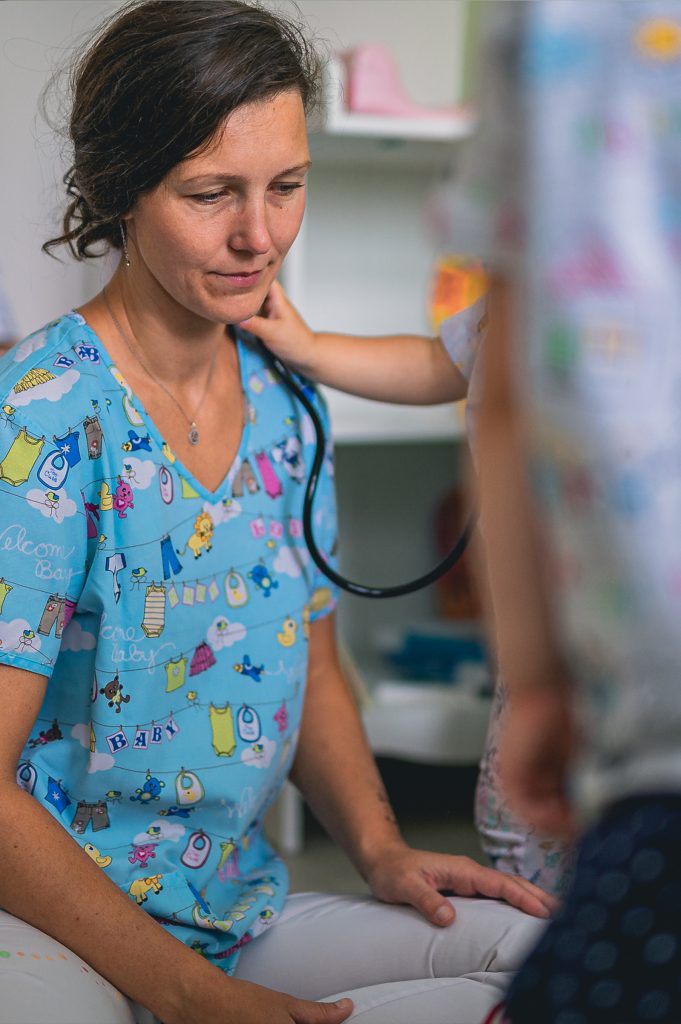
Elenka Lopes Rua
How I became a pediatrician

I started my medical journey at the First Faculty of Medicine of Charles University in Prague. I came to fully understand the true value of this decision only now, after many years. Everything I had learned there has already saved my day many times. I had a chance to observe experts and today’s medical influencers working on their everyday challenges.
My pediatric career started at the General Department for children at Dunajská Streda Hospital.
We dealt with common respiratory, gastrointestinal and urinary tract infections. In the intensive care unit we cured and monitored patients with seizures, severe dyspnea, anaphylaxis, intoxication. In addition to the basic management of newborns in the Newborn’s Department, we dealt with newborns with asphyxia, adaptation difficulties, early postnatal infection, feeding troubles and congenital malformations.
Dunajská Streda is a very specific region. We were often collaborating with the Office of Social Affairs and Family to secure correct and safe development of children in our care in their original or foster families. I learned to communicate with patients and families on different levels. I had to learn how to get their compliance, to build and foster mutual trust. It was my chance to see how living conditions can impact the medical treatment and mental condition.
Our department had a very good cooperation with laboratory departments. That means we had a possibility to do point-of-care testing of various infections. It helped us to do prompt diagnostics and for example to prevent antibiotic overuse.
Nowadays the pace of life is fast and full of information. There are many sources: old medicine, new medicine, alternative medicine and Google. It is quite challenging to find a suitable solution for all involved. There are notable differences among the doctors too. Often there are different outcomes even with the same information available. I learned to trust very few people and myself. I recognized my responsibility to choose the right information and suitable treatment beneficial for my patient. So much for the knowledge I had gained in Dunajská Streda.
My next position involved teaching at the Second Pediatric Clinic of the Faculty of Medicine of Comenius Universtity and Childrens Hospital in Bratislava. Compared to the regional hospital where I used to work, this was quite an awaking experience. In a small hospital, there is almost zero logistics around the patients. In Bratislava, patients were running between diagnostic and therapeutic departments of all kinds. This situation really required some urgent skill adaptation on my side. My responsibility was to keep the patients on track and watch out for everybody to get where they were supposed to be while dealing with lots of paperwork and phone calls. And of course, teaching from time to time. The flow in this department often resembled to me a train with no breaks.
Working at the clinic had many benefits too. I strongly improved my skills when it came to writing documentation. I learned to write shorter and more exactly including a compact history of a patient, clear results and exact recommendation. I had learned to keep my documentation and intentions understandable for other doctors to take over my patients. I met children with diagnoses that were new to me. My communication skills with patients and parents were enriched thanks to these new experiences.
Gradually I could continue my pediatric specialization in other departments (Infectious Diseases, Pathologic Newborn Department, Ophtalmology). Meanwhile, I received an opportunity to work for a few days a week in a primary care outpatient office with Dr. Krajčírová. She kindly shared her experience and thoughts with me. This way I could improve in primary care.
I am a proud mother of two beautiful girls. Learning from them I had to change my mindset completely. There are too many details I would not even consider before. Children do not care about time. They do not understand the reason why they should eat some bad tasting medication. Children do not stay in bed just because I want them to. They stop eating and drinking if their stomach hurts. Many times it is hard to find a reason they do not want to cooperate. Sometimes they are only being playful, l other time they can be scared or hurt.
This is a new role where I have to be playful and creative, sometimes strict enough, other times just wanting less. It is challenging but beautiful. Surely it brought me more understanding of other parents but also of children’s minds.
That is actually one of the purposes of the OKiDOKi project: to connect medical expertise, experience and everyday life.
